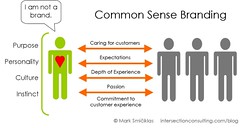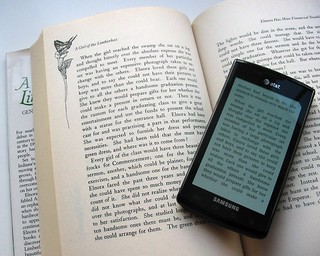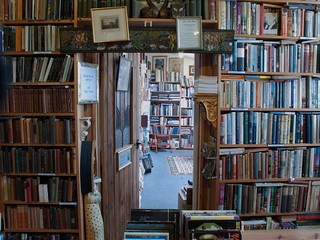With so much discussion in the blogosphere about self-publishing versus traditional publishing, I’ve been doing a lot of reading just to keep up. My conclusion is that a hybrid model is the path with the greatest reward for the fiction author. It also requires a great deal of work. What do I mean by hybrid? I’m glad you asked…
Types of Publishing
“Self-publishing” here refers to creating an ebook, which you will then publish to various retailers like Amazon, Barnes & Noble, Kobo, and Smashwords. You may also use CreateSpace or LightningSource to publish print-on-demand paper books, but that’s an entirely different topic.

What I mean by “traditional” publishing is really more of a spectrum, ranging from small publishing houses to the larger well-known publishers. Most of my notes below apply more to the large publishers than the small ones, however.
I’ve self-published The Last of the Ageless and am now deciding what to do with my next book. Keep up with all the news by joining the Vanguard!
Long-Term Planning
If you want to be a career writer, you must think beyond this book and beyond one year’s income. Chances are you’re not going to strike it big either way (traditional or self-publishing) with your first book.
Advances even from the large publishing houses are shrinking. As a first-time author, you might get a $2,000 advance. And that may be all you ever receive on that book. Then it may be a while before you get the rights back.
This is why I advocate self-publishing as being the right path for your first book in particular. During the time you would spend looking for an agent (and then the agent looking for an editor), you could begin making money off the book. However little, it’s still something. You’ll also be building your brand at the very least.
 It may take years before you earn back what you spent on good cover art and editing costs for that first book. But had you spent that time waiting for an agent to pick you up, you would be invisible to readers. From a business perspective, this is the cost of launching a startup.
It may take years before you earn back what you spent on good cover art and editing costs for that first book. But had you spent that time waiting for an agent to pick you up, you would be invisible to readers. From a business perspective, this is the cost of launching a startup.
Another thing to keep in mind is that it’s now possible to self-publish your book and then have a traditional publisher buy it (either just printing rights or both). It’s not common yet, but I believe we may begin moving in this direction. Look at Hugh Howey, Michael Sullivan, etc.
However, I don’t believe that needs to be your end-goal. Why put all your eggs in one basket with just one book or series? Instead of self-publishing a book in the hopes of getting it picked up by a traditional publisher, keep producing more books. Surveys show multi-published authors are more successful. For each book, ask yourself what’s right for that book: self-publishing or traditional?
Traditional publishing still focuses heavily on the first few weeks of sales. If you don’t do well during that time, publishers and bookstores may not pick up your next book. Alternately, if you’ve demonstrated good sales on, say, your first three books via self-publishing, a publisher might buy your fourth book. You’d already have a following established, and would then put those first six weeks of publication to good use by encouraging your fan base to head to the bookstore.
Disadvantages
Of course, it’s true that fewer reviewers and book bloggers accept self-published books for review right now. And many readers consider self-publishing as little more than vanity publishing, and won’t buy those books.
It’s also still hard to get into libraries as a self-pub, but authors like Cory Doctorow are exploring this. If the big names pave the way, we may soon see a method to the madness for getting into libraries.
So you’ll have all of that working against you as you begin your writing career with self-publishing. Don’t expect to make a ton of sales as you begin your career.
But don’t let that stop you. Many readers pay no attention to who publishes a book. They just read what their friends/Goodreads/Amazon suggest to them. For now, this is the audience you’re looking for. And this is where you, as a self-published author, have an advantage.

Publishers don’t price ebooks fairly from a reader’s perspective. Many readers still see anything above $9.99 as ludicrous, and most expect lower than that. With a traditional publisher, you’d have no control over price. If they/retailers decide on $11.99, but you think you’d move more copies and gain a larger readership at $7.99, too bad.
Consider how you can delight your readers. If you’re traditionally published, you may miss opportunities to promote your work due to red tape. For instance, HumbleBundle. If your contract doesn’t allow it, you may not be able to give away your short story set in the same universe for free.
Once you’ve figured out a way to generate buzz around your book, your readership will increase by word of mouth (or the Internet equivalent — social media). The best part is, you’ll have access to real sales figures rather than six-month reports, and you’ll be able to offer timely promotions throughout the year.
E-Publishing
A huge reason to choose self-publishing for your first few novels is the rise of the ebook.

Borders is gone. Barnes and Noble is looking rocky. We don’t have any other large-scale chains here in the US. That leaves the indie bookstores, which don’t always have much shelf space. How confident would you be that your traditional publisher can get you the distribution you were hoping for if BN goes away?
Some estimates put fiction ebook sales at 50% of total fiction sales. Yet publishers still continue (in many cases) to put hard cover out first, then ebooks and paperback. This infuriates many readers. (Some hubbub over the ebook of A Memory of Light was not the publisher’s doing, but shows how incensed readers can become over late ebook publication.)
The good news is that indie bookstores are beginning to sell ebooks in partnership with Kobo.
Crossing Over
However, as a new author, you have to keep in mind that the most successful self-published authors are multi-published with eight or more books. Are you able to ignore low sales and just keep writing?
That’s why you’ll want to capitalize on the best of both worlds. When you’ve proven that you can develop a readership (however small) for your first few books, you’ll be better poised to sell your later books to a traditional publisher.
After everything I mentioned above, why would you want to do that?
We’re in the midst of a huge upheaval, but right now, traditionally published authors are still better recognized nationwide, worldwide, in libraries and bookstores, than self-published authors.
Once you’ve gotten a handful of books out there and have begun building your readership, you’ll be able to look at the long-tail of your books. Look at a ten-year span and make some estimates on how much you could make earning 70% on a lower-priced self-pub ebook (and possibly POD book) with a smaller readership versus 6% to 20% on a higher-priced traditionally published book (and ebook) with a larger readership. Figure out the math that makes sense to you before you sign over for an advance.

Once you get that first traditionally published book out there, you’ll be able to capitalize on all the good things about the traditional method. You get free editing and book cover design. You’ll have less say over this book’s cover, edits, and price, but that should be a perfectly acceptable trade-off at this point, considering the publisher will bring you greater recognition.
Traditional publication helps you build name recognition and a readership. You’ll have access to all those book bloggers, reviewers, bookstores, and libraries you may have missed out on with your past self-published books. You’ll also have a greater chance of getting translation services to help you penetrate global markets. And you’ll be able to join professional groups like the Science Fiction & Fantasy Writers of America (SFWA).
Of course, you will still face all the pitfalls of traditional publication, but I again urge you to look at your writing career in the long-term. You’ll be a multi-published author by this point. Whatever name recognition the traditional publisher gets you for this book will also drive sales to your other books as readers seek out your other work.
Become a Hybrid
Don’t think of self-publishing versus traditional as either/or. Do both. Choose whichever feels right for this book, and consider doing the other when you’re ready. Then flip back when you need to. Always keep your options open, and be careful. Either way, you’ll bring your audience with you, either from traditional over to self-pub when you go, or from self-pub over to traditional if you strike a deal.

With hybrid publishing, you will have learned more about readers, the market, and running a business than you ever could have choosing one over the other. With your self-publishing experience and past sales data, you’ll have learned how to respond to changes in the market and how to stick out from the crowd.
You will have experienced the advantages and disadvantages both types of publishing have to offer, and will be better informed with each book you publish.
Readers follow authors, not publishers. It’s tough knowing which method to use for which book, but each author must decide that for themselves.
Publishing is evolving faster than ever, so keep yourself in the loop with blogs and discussion forums. Focus on what your readers want and how your publishing decisions affect them, then go from there.
Keep up with my publishing news and get four FREE short stories when you join the Vanguard!
Comments
3 responses to “My Future Publishing Path”
Sounds like we have similar thoughts, we must also have great minds. I think the independent writer is the future. Self-publishing, not vanity press, will become the minor leagues for traditional publishing. Even small presses have begun to require writers to have agents. Novelists will write, publish, promote, and market their own books and once they have a proven following traditional houses and agents will seek them out.
I think I'm on a similar path. I'm about to put out my second self-published book, and I have a separate series coming up soon as well. I will remain on this self-published path for at least the rest of this year and probably a good chunk of next year.
After that, I have ideas for three other unrelated series that I might submit to traditional publishing. They're in the same genres as my self-published work, so the name recognition will carry over.
My biggest concern, however, is whether or not I'll get a contract I'm willing to sign. Even apart from the recent atrocities from Hydra/etc., there are plenty of poison pills in the standard contracts from the respectable imprints. This includes things like life-of-copyright license without a clear termination clause, non-compete agreements making it hard to continue a self-published career in parallel, and rights-grabs for rights they will never exploit but prevent you from doing so. Even for the benefits of the recognition, I'm not sure I'd ever sign a contract with those clauses, and even with a track record of self-publishing sales, I don't think I'd have the clout to get them removed.
Of course, with self-publishing in the background, I could always say no and walk away. Nonetheless, that's where I'm headed.
Thanks for stopping by, guys! What intrigues me most about the idea of being a hybrid is that you could make a living even as a so-called "midlist" author. I've seen some numbers from the traditional bestsellers, and it looks like even they have trouble making ends meet without a day job!
Rocky, look at you on Google+ too! I'll shoot you an invite to the Spec Fic Writers Community in a minute…
I agree, Dan. Traditional publishing has become the big bad wolf. It'll take a lot of fighting tooth and nail to get a reasonable contract. But my hope is that if the giants go first (like Hugh Howey, etc.), they'll pave the way toward more reasonable contracts. Because they really can just walk away.